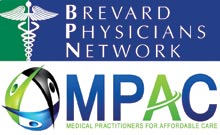Year In Review: Healthcare Highlights Of 2012
By Dr. James Palermo // December 31, 2012
Healthcare News
BREVARD COUNTY, FLORIDA–Since SpaceCoast Daily.com’s launch in April, we have covered a multitude of healthcare topics and issues with the intent to provide interesting and useful information to keep you up to date on the ever changing healthcare landscape and help you make decisions for yourself and family that optimize your health and well-being.
Looking back on some of the healthcare highlights of 2012, like many of you, we wonder where in the world the past 12 months went, and are trying to understand the changes ushered into the healthcare system that impact us as consumers of care and those who care for us.
Here are ten of the most notable healthcare stories on which we reported in 2012.
U.S. Supreme Court Upholds Obamacare Mandate As A ‘Tax’

The U.S. Supreme Court (SCOTUS) ruling on the constitutionality of the Patient Protection and Affordable Care Act (PPACA also called Obamacare) was handed down in late June when the high court, by a 5-4 decision, upheld the law, elements of which had been ruled by lower courts to be unconstitutional.
With one sixth of the U.S. economy, and care and coverage for tens of millions of Americans affected, this landmark SCOTUS decision impacts the provision of healthcare and health insurance in America for decades to come.
Florida 42nd On Wellbeing Index
Florida was again in the bottom 10 nationally on the 2011 Gallup-Healthways Well-Being Index with a score of 64.9, a slight decrease from its 2010 score of 65.1. In order to turn that trend around, Space Coast healthcare systems are actively transitioning to new models of care, which focus on improving wellness and population health management and require a paradigm change in the way providers collaborate and manage wellbeing and how payers pay for it.
Physicians and Hospitals Increasingly Joining Forces
The new models of care, which are focused on quality, safety, effectiveness, efficiency and the ability to optimally manage populations over a continuum, require tightly integrated and aligned relationships between physicians and hospitals.

This proclivity for ever-increasing hospital system-owned physicians is evident here at home with HMA/Wuesthoff adding on to their employed physician group by bringing Osler into their system last year, and Health First expanding their multispecialty physician group to over 250 by acquiring Melbourne Internal Medicine Associates (MIMA) in November.
Physicians and healthcare systems working closely together with shared organizational strategies, goals and incentives should be mutually beneficial to patients and providers, and improve healthcare in our community.
Rate of Autism On the Rise In U.S. Children

Cases of autism are soaring at an alarming rate. About one in 88 U.S. children has been diagnosed with autism or a related disorder by age eight, according to a Center for Disease Control (CDC) study done in 2008 and released in late March of this year. Dr. Ivy Chong, Program Director of the Florida Tech Scott Center for Autism Treatment addressed frequently asked questions and misconceptions about autism in a SCD.com Q&A.
Historic New Payment Model for Healthcare Services
Driven by Medicare reimbursement regulation established in the Patient Protection and Affordable Care Act (PPACA), the government has taken the focus on performance to the next level for 2013 by calculating a pay-for-performance (now named Value Based Purchasing [VBP]) quality score based on each hospital’s performance as reported to the Centers for Medicare and Medicaid Services (CMS).

The program is intended to help Medicare flex its muscles and move from being a passive bystander to an active purchaser of higher-quality healthcare.
Of the 57% of Florida hospitals that performed above the benchmark and earned a 2013 Medicare payment bonus, three are on the Space Coast, with Parrish Medical Center and Sebastian River Medical Center earning a 0.43% bonus and Palm Bay Hospital a 0.19% bonus.
Be Safe: Ask Tough Questions of Your Doctors
Your health depends on good communication. Asking questions and providing information to your doctor is an integral element in ensuring high quality, effective and efficient care, and talking with your doctor builds trust and leads to better outcomes and higher satisfaction.
Get involved in your care! Although your health care providers are always working to keep you safe, you are still your own best advocate when it comes to your health. It may not be easy, but summon the courage to speak up and ask questions.
CDC Report: Deaths From Complications In Sharp Decline
In November of 1999, the Institute of Medicine (IOM) released a compelling report called To Err is Human: Building a Safer Health System to the national media, which recognized this opportunity for a headline story describing a very large number of hospital deaths from medical errors and complications—possibly as great as 98,000 per year.

Those of us in the healthcare industry were incredulous and put on the defensive. However, as we threw ourselves into a much deeper analytic dive into who or what was to blame and how to fix the problem, it became increasingly clear that preventable harm was not a property of health care professionals’ competence, good intentions, or hard work, but rather a property of a system of care in which specific attention must be given to ensuring that well-designed practice and processes of care prevent adverse medical events and complications so that patients are not harmed.
There was very good news in a September report from the Centers for Disease Control and Prevention (CDC) that suggests that the healthcare industry’s focus on transforming care models and hospital cultures is making significant strides, with preventable complications and deaths from complications declining significantly over the last decade. The report is part of CDC’s National Vital Statistics System .
Is There A Doctor In The House?
The most critical challenge of the PPACA (Obamacare) is effectively covering the costs of supplying insurance to protect a broader scope of our population. The implementation of Obamacare will undoubtedly continue to be a socioeconomic-political football and be debated for years to come.

However, one very fundamental truth, which raises a major question, remains. There will be an increased demand for primary care physicians (PCP), but where will this new wave of PCPs come from and–bottom line–who will see all of the new patients?
There is a looming crisis in primary care, with the shortfall of doctors estimated at 30,000 over the next couple of years. An aging PCP physician population and increasing elderly population certainly contribute to the problem. However, a proclivity of new physicians for “hospital medicine,” such as emergency medicine physician and hospitalists, physicians who take care of hospitalized patients but no longer have office-based practices or do primary care, has also taken thousands of physicians out of the potential primary care workforce.
MPAC Of Melbourne Chosen By CMS As ACO
Medical Practitioners For Affordable Care (MPAC) was selected in August to participate in the Medicare Shared Savings Program (Shared Savings Program) Accountable Care Organization (ACO), a multifaceted new program sponsored by the Centers for Medicare and Medicaid Services (CMS).
 MPAC, based in Melbourne and comprised of over 145 participating local physicians, is the only Brevard County and one of 10 Florida medical groups that were officially designated by CMS as an ACO, which offers medical groups, hospitals and federally qualified health centers financial incentives for quality improvement and cost control.
MPAC, based in Melbourne and comprised of over 145 participating local physicians, is the only Brevard County and one of 10 Florida medical groups that were officially designated by CMS as an ACO, which offers medical groups, hospitals and federally qualified health centers financial incentives for quality improvement and cost control.
MPAC is comprised of a high quality, well motivated group of physicians who, through the Shared Savings Program, will work with CMS to provide Medicare fee-for-service beneficiaries with high quality patient-centered service and care, while reducing the growth in Medicare expenditures through enhanced care coordination.
Health First, Space Coast Health Foundation Combine To Serve Needy
After unanimous votes by both Boards of Directors, Health First and Space Coast Health Foundation (SCHF) have announced an agreement to settle the long-standing antitrust lawsuit and work together to enhance healthcare access and services in Brevard County.
Instead of spending time and money on court costs and legal fees, Health First and Space Coast Health Foundation (formerly Wuesthoff Health System), have put the anti-trust case behind them and entered into a confidential agreement that will create a new health program for Brevard County.
The program is in development and will enhance benefits for the underinsured in Brevard County.
Change For Sure With a Mix Of Uncertainty And Hope For 2013
Healthcare is changing–the people, the systems, the cultures, the payment models and the degree to which government is involved in your personal pursuit of health and well-being. The size and complexity of Obamacare makes its implementation perhaps the most monumental politico-operational challenge in American history. Post-election, new regulations are pouring out from the Department of Health and Human Services—more than 13,000 pages so far, but many of the very difficult questions related to actual implementation and execution of Obamacare’s fundamental programs are still unanswered.

Although change in the healthcare industry has traditionally been ponderous, what we are experiencing now is the realization by all stakeholders that there must be a very considerate and deliberate transformation. The primary issues remain– where will we find the providers to meet the ever-increasing needs of the population and how can the historically astronomical costs of care be controlled while maintaining and improving the quality of care, safety and service?
We look forward to unbiasedly reporting on the historical healthcare events, new developments and innovative programs that address these issues as they unfold in 2013.
Everyone here at SpaceCoastDaily.com and Space Coast Medicine and Active Living Magazine wish you and yours a very Happy and Healthy New Year.












